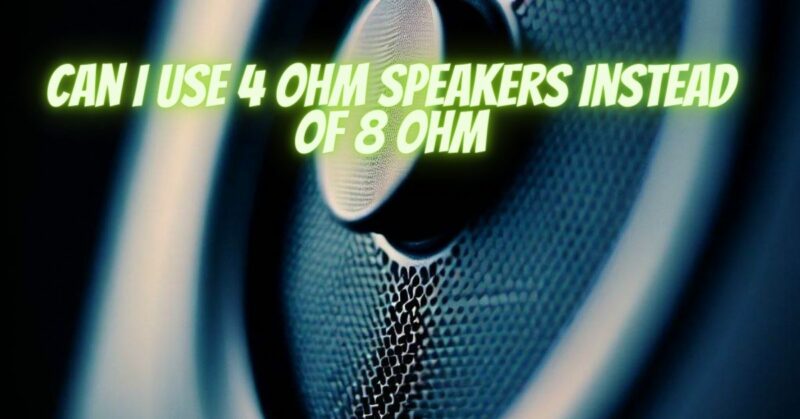In the realm of audio systems, the concept of impedance plays a pivotal role in ensuring proper functionality and sonic quality. Impedance, measured in ohms (Ω), determines the resistance to electrical current flow within a circuit. When it comes to speakers and amplifiers, matching the impedance is crucial to achieve optimal performance and prevent potential damage. One question that often arises is whether it’s possible to use 4 ohm speakers in place of 8 ohm speakers or vice versa. In this article, we’ll delve into the implications of using 4 ohm speakers instead of 8 ohm ones, and the factors you need to consider.
Understanding Impedance
Impedance refers to the opposition that an electrical circuit presents to the flow of alternating current (AC). It’s a complex interaction that involves both resistance and reactance, which is the effect of inductance and capacitance in the circuit. In speaker systems, impedance is a critical parameter that must be considered when connecting speakers to amplifiers.
The Rule of Thumb: Matching Impedance
The general rule of thumb when it comes to impedance is to match the impedance of the speaker to the impedance of the amplifier. Most amplifiers are designed to work with specific impedance values, commonly 4 ohms, 8 ohms, or 16 ohms. Using mismatched impedance can have significant consequences:
- Power Transfer: Impedance mismatch can result in inefficient power transfer from the amplifier to the speaker. This can lead to reduced sound quality and lower overall volume levels.
- Overloading Amplifiers: Using speakers with lower impedance than the amplifier’s rating can put additional strain on the amplifier, potentially leading to overheating and damage.
- Underutilizing Potential: Using speakers with higher impedance than the amplifier’s rating might not allow you to fully utilize the amplifier’s power and potential.
Using 4 Ohm Speakers with an 8 Ohm Amplifier
Using 4 ohm speakers with an amplifier designed for 8 ohms can lead to issues:
- Increased Current Load: 4 ohm speakers draw more current from the amplifier compared to 8 ohm speakers. This can potentially overload the amplifier, causing distortion or even damage.
- Heat Generation: Higher current demand can result in increased heat generation within the amplifier, which may affect its longevity and performance.
- Amplifier Compatibility: Some amplifiers might be able to handle lower impedance loads to a certain extent, but it’s essential to consult the amplifier’s specifications and guidelines before attempting such a setup.
Consulting Manufacturer Specifications
Before considering using 4 ohm speakers with an 8 ohm amplifier, it’s crucial to consult the specifications provided by both the speaker and amplifier manufacturers. They will provide guidance on impedance compatibility and the potential consequences of mismatched impedance. In some cases, amplifiers might have switchable impedance settings to accommodate different speaker configurations.
While the allure of using 4 ohm speakers instead of 8 ohm ones might be tempting, it’s important to approach this with caution. Impedance mismatch can lead to issues such as inefficient power transfer, overloading amplifiers, and potential damage. The best approach is to follow the guidelines provided by the manufacturers of both your speakers and amplifiers. By respecting impedance specifications and understanding the potential consequences, you can ensure that your audio system operates smoothly and produces the best possible sound quality.


